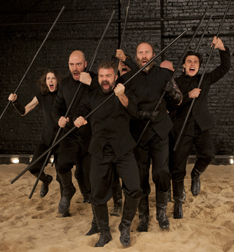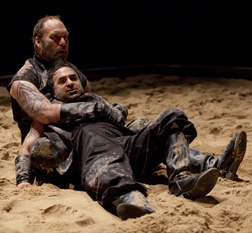By Lucy Komisar
Directors in modern times have enjoyed playing with Shakespeare, often modernizing his plays, putting actors in scenes and clothes that are not of the period described. But Brian Kulick, artistic director of the Classic Stage Company and the adapter/director of this play, has gone one better. He entwines Shakespeare’s Troilus and Cressida, set in Troy during the Trojan War, with The Iron Age by Thomas Heywood, a contemporary. Shakespeare’s is the more personal play, and much of the macho jousting seems inspired by Heywood’s war story. The amalgam is a worthy effort, better than most of what we see in the theater today, though I think I’d rather have seen Shakespeare’s work. This one often lacks his poetry.
The story centers on the war sparked when Paris of Troy stole Helen, wife of Menelaus, King of Sparta, and took her home to what is now Turkey. The Greeks set sail to get her back and a ten-year war ensued. As Shakespeare wrote it, Troilus calls Helen a pearl, whose price hath launch’d above a thousand ships. Kulick has Helen say, This is the beauty that launched a thousand ships from Aulis‘ gulf? It doesn’t scan as well.
Kulick says that the Heywood contribution is mostly as prologue and epilogue. But more than that, while Shakespeare makes the relationship between Troilus, Paris’s brother, and Cressida, daughter of a Trojan priest, the center of his play, Heywood focused more on the wider war. So, there’s a lot of clash of metal under Kulick’s lively direction. Troilus, who’s alive at the end of Shakespeare’s play, is killed on the battlefield in this version.

Then how can you review this? It’s not a play of Shakespeare or of Heywood, but an adaptation by Kulick. Scholars have already pointed out echoes of Shakespeare in Heywood’s plays. In this case, the first act is rather muddled, and some of the shield clashing and spear fighting seems made for the movies, but the story pulls together in the second part.
Best are the personal and introspective scenes. The play starts with the Trojan Paris’s (Craig Baldwin) seduction of Helen (Tina Benko), who wears a diaphanous low-cut gown and seems to enjoy all the attention. His brother Troilus’s (Finn Wittrock) courtship of Cressida (Dylan Moore) also grabs your attention; both fine actors show a solid presence and exude sensuality.
These stories make more sense than the complexity of rivalries and interactions of the Greek and Trojan warriors, though the women both get short shrift for fickleness. Helen is carried off, Cressida is transferred as a chess piece to win a soldier’s freedom; neither seems to have had a lot of choice. Kulick is kinder to Cressida than Shakespeare on that account.
Kulick has smartly included a lot of Thersites (Steven Rattazzi), the Greek railer, a fool, who is brilliantly portrayed by Rattazzi with scowls and growls and theatrical trills.
The verbal joust between the Greeks Ajax (the excellent Bill Christ) and Ulysses (a solid Steven Skybell) is a fascinating look at the conduct of war, with the first proclaiming his military prowess (I had rather fight than talk.) while the other advances the superiority of strategy.
I miss much of the elegant Shakespearean phrasing we are used to. There is some of the famous smart dialogue, as Cressida’s speech to Troilus: But, though I loved you well, I woo’d you not; And yet, good faith, I wish’d myself a man, Or that we women had men’s privilege of speaking first. But there’s not enough of that. The emphasis is on action. Sometimes the dialogue between the martial antagonists gets a bit turgid. And the choice of a woman dressed as a man to play Achilles’ homosexual lover is confusing.

The set by Mark Wendland is a giant sandbox that the actors tramp through and roll around in. Is that a commentary on the goings-on? The Greeks and Trojans decide to have rivals challenge for Helen’s favor. As Thersites explains, Wars and lechery, nothing else holds fashion. (Shakespeare.) Later, Thersites gasps to Ajax, who has him in a wrestler’s lock, about the uselessness of all war.
Kulick’s directing is first-rate, turning the sandbox into a boudoir and field of battle at will. (And aren’t they both games?) The cast is uniformly good, with several standouts cited.
Reading Troilus and Cressida before you see the play might add to your enjoyment so you get an idea of which is Shakespeare and which is Heywood. And perhaps you can guess which is Kulick.
The Age of Iron. Drawn from Shakespeare’s Troilus & Cressida and Thomas Heywood’s Iron Age, adapted and directed by Brian Kulick. Classic Stage, 136 East 13th Street, New York City. 212-352-3101. Opened November 22, 2009; Closes December 13, 2009. www.classicstage.org.

